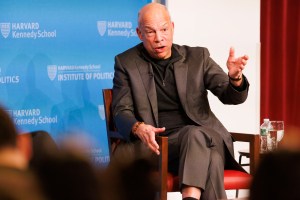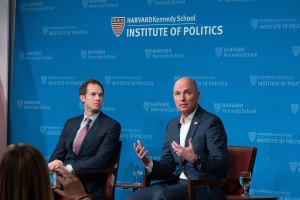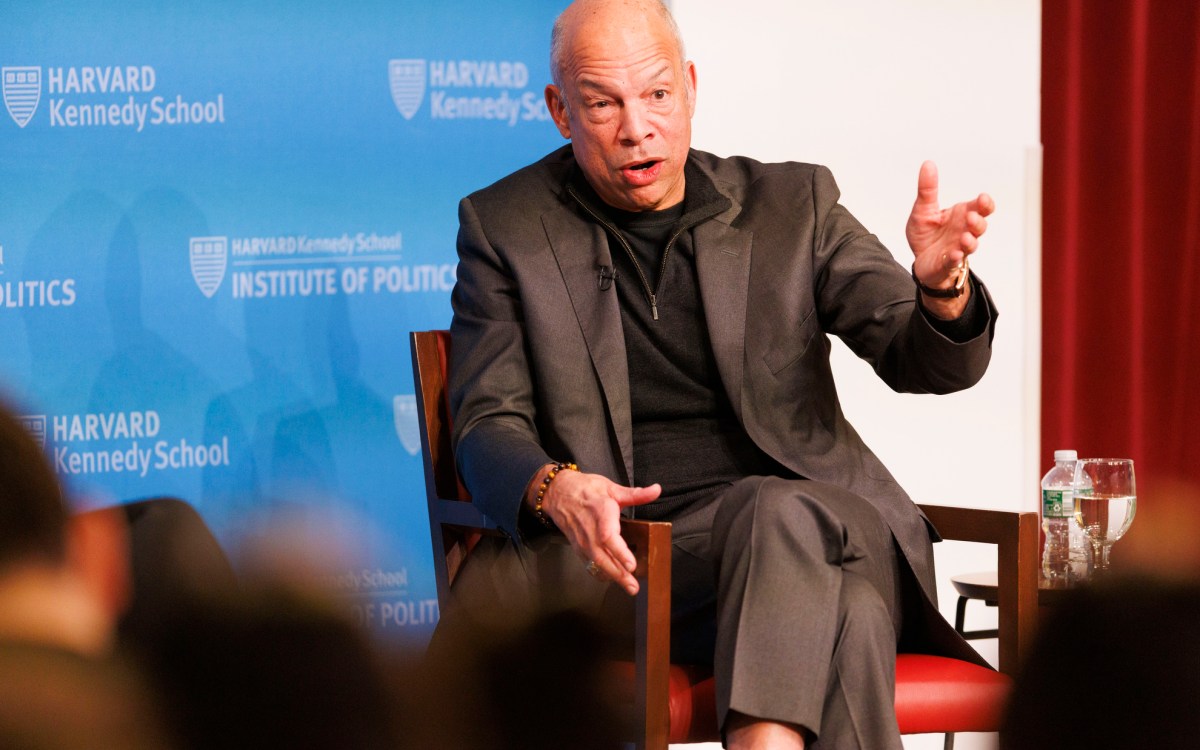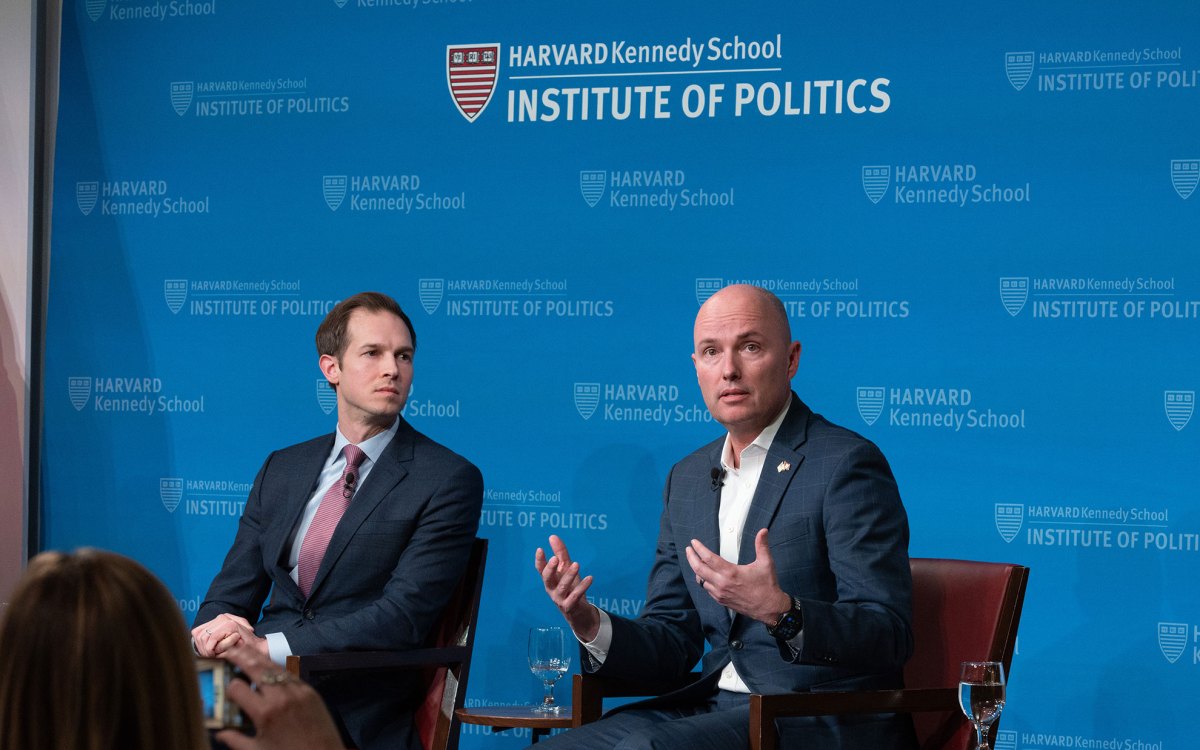That first draft of history
As he heads to Harvard, veteran CBS correspondent Bob Schieffer reflects on half a century covering the news
In the half-century spanning the shift from reporters in snap-brimmed hats typing stories on Remingtons to filing on their cellphones with Snapchat, journalist Bob Schieffer has had a front-row seat for the country’s most important political events.
His big break came early, in November 1963 while answering the phones as an overnight police reporter at The Fort Worth Star-Telegram. A woman on the line said she needed a ride to the Dallas police station. After nearly hanging up on her, as Schieffer told CBS News in 2013, “I said, ‘Lady, you know, we’re not running a taxi service here. And besides, the president’s been shot.’ And she says, ‘Yes, I heard it on the radio. I think my son is the one they’ve arrested.’ ” Minutes later, Schieffer was driving Lee Harvey Oswald’s mother to Dallas.
In May, Schieffer retired after 46 years with CBS News, where he was the network’s chief Washington correspondent and at various points covered the White House, Congress, the State Department, and the Pentagon. For more than two decades, he anchored the Saturday edition of “CBS Evening News” and moderated the Sunday political roundtable “Face the Nation.” He earned numerous awards, including eight Emmys and the Edward R. Murrow Award, and is a National Academy of Arts and Sciences Hall of Fame inductee.
This month, he begins a three-semester appointment as the Walter Shorenstein Media and Democracy Fellow at the Shorenstein Center for Media, Politics, and Public Policy at Harvard Kennedy School, where he will focus on the 2016 presidential election. From noon to 1 p.m. on Sept. 15, Schieffer will address the status of the election campaign as part of the Shorenstein Center Speaker Series at Harvard Kennedy School’s Taubman Building.
Schieffer spoke with the Gazette about his career, the evolution of American politics and journalism, and what he’s looking forward to during his time at Harvard.
GAZETTE: Did you ever imagine life after journalism? How does it feel so far?
SCHIEFFER: If somebody had told me when I was working the night police beat at The Fort Worth Star-Telegram that I’d be lecturing at Harvard, I would have thought they were out of their mind. I’m not only honored to be doing this, there’s a certain amount of humor in it. I’ve been to Harvard many times over the years, and I love to come up there, so this is going to be a lot of fun, and I’m really looking forward to it.
GAZETTE: When you look back, what’s been the most satisfying work you’ve done?
SCHIEFFER: The part that I feel so lucky about was when I was in the eighth grade, I decided I wanted to be a reporter. I wanted to be a newspaper reporter after I wrote my first story in the junior high school newspaper. Then I grew up and got to do that. And that is the part that I feel most thankful about. The second half of the 20th century was a very important time, and I got to be there for a lot of those big events. The stories that had the biggest impact on me were, first, the Kennedy assassination and then 9/11. I was there for both of those major events. Between those, you had Watergate and the Vietnam War. Oddly enough, most of the recognition I got in my career came after those events, and after I was 65 years old, when most people retire. I wrote three books after that, one of which was a bestseller, “This Just In.” I also moderated three presidential debates in those years. I’ve always kind of joked that if I were a racehorse, the touts would probably list [me as a] “late foot.” I kept moving around the track after most people had gone off to retire.
GAZETTE: Journalism has changed dramatically from when you first started out. Is the profession better or worse now, and is the public better served or not as a result?
SCHIEFFER: It’s a very hard question to answer as to whether it’s better or worse. What has happened is it’s been turned upside down and we’re still trying to figure it out about where we are, where people get their news. When I was a newspaper reporter, most people got their news from the printed press, from newspapers. The idea that, when I came to work in Washington in 1969, that a Washington Post reporter would be carrying a video camera when he went out to do an interview with somebody — no one could have imagined that. The whole idea of how we get information and how we try to explain to people what’s going on, all of that has changed. I know we can do it a lot faster, but whether we’re giving people the complete story, that’s a whole different question.
GAZETTE: Now that you’re off the clock, what do you think of the 2016 presidential race so far?
SCHIEFFER: Every campaign is different, and this may be the most different yet. I think we’re at a real turning point in this country. I think we’ve had a total breakdown in our political system: the way we elect people, the way we conduct our politics now. And you can see it on both sides now, Democrats and Republicans. This is not the way that we ought to be electing people, and these are not campaigns that are about what they ought to be about. I think it all goes back to the way that money has now overwhelmed our political system. People used to get into politics because they wanted to change things, or they wanted to do something. And we have too many people now who are just running to get themselves elected so they can raise some money and get elected the next time and use these congressional/federal offices as a steppingstone to bigger and better things. And it just didn’t use to be that way.
I take Donald Trump very seriously now. I think he could wind up getting the Republican nomination. He keeps saying what all he’s going to change, but he hasn’t offered any solutions yet. So I don’t know where this goes.
GAZETTE: Why do you think Trump has been able to grab people and defy all conventional wisdom?
SCHIEFFER: I think he’s made a very good list, a wonderful catalog, of all the things that people are upset about and worried about and concerned about. He hasn’t proposed any solutions, but he has managed to make a list of things that people feel frustrated about, and I think this frustration comes from the fact that the government doesn’t work anymore. [Ronald] Reagan used to talk about the “shining city on the hill.” Well, we’ve become the town where nothing works. The IRS doesn’t work, the Veterans Administration doesn’t work, the EPA sets off a disaster in Colorado. Nothing seems to work the way it used to, and people are upset about that. He says he’s going to build a wall down along the southern border and make Mexico pay for it. How? Who’s he going to send the bill to? Does he send it to the mayor of Juarez, or does he send it to the president of Mexico? And how’s he going to collect? These are not solutions.
GAZETTE: Last May, Fox’s Howard Kurtz asked you if the media had been too easy on Barack Obama during his 2008 presidential campaign. You said, “I don’t know. Maybe we were not skeptical enough.” Can you elaborate? What did reporters miss?
SCHIEFFER: I don’t really think that reporters had the kid gloves on with Barack Obama, but he was new, and he was exciting, and he was a great story, and he made a great speech. And I think people didn’t question how’s he going to get these things done, how will he be at getting coalitions together, how well did he get along with people in the Senate while he was there, those kinds of questions. I think we probably should have been more skeptical, but he was such a good story.
GAZETTE: Of all the presidents you’ve covered, who had the worst and best relationship with the press?
SCHIEFFER: You have to put [Richard] Nixon off in a place by himself — he’s retired several trophies. But the fact was he also accomplished some very good things: the opening to China, the arms control [treaties] that he negotiated with the Soviet Union were major achievements, and you’ve got to give him credit for that.
GAZETTE: He didn’t get the appropriate credit at the time?
SCHIEFFER: I don’t think he did. But the fact is he did some important things in foreign affairs; he just didn’t know very much about the Constitution.
Jimmy Carter had a very, very difficult time with the Congress. He flooded the Congress. He came in with a lot of ideas, some of which were quite good. But in the beginning, he didn’t have a chief of staff, and he didn’t set priorities, and he just overwhelmed the Congress, and they didn’t know which things he thought were the most important. And so, as a result, he didn’t get very much done. The Camp David peace accords were extremely significant, the most important legislation or agreement of this century in regard to Israel because it removed Egypt as the main opponent and threat to Israel, and that’s a big deal.
I think in, retrospect, Reagan turned out to be a better president than I thought he was when he was president, because he wasn’t solely responsible for bringing down the Soviet Union by a long shot, but he forced them to spend more than they had to spend on defense, and their whole economy collapsed. So I think you have to give him credit for that.
Lyndon Johnson, who made an enormous mistake about Vietnam, was probably, in retrospect, the one who knew the most about the government and how to make the government work. The ’64 and ’65 Civil Rights bills were remarkable pieces of legislation, and I think only now are we beginning to give him the credit that he deserves on that.
GAZETTE: Wasn’t his relationship with the press pretty testy?
SCHIEFFER: It was testy, but he knew how to work the press. He would deal directly with reporters. I mean, if he didn’t like the story, he would call them up and he would tell them. And he dealt the same with the Congress. But he got a lot done. Some of the reporters liked him, and some of them didn’t. He knew the issues, and he knew who was important and what you had to do to get something passed. And he did that time and time again.
The person who had the best relations with the press was Gerald Ford when he came in, before he pardoned Nixon. After he pardoned Nixon, his relations were never quite as good as they had been at the time. I have now come to believe, as has Bob Woodward, that pardoning Nixon was the right thing to do. But I can remember, I was the White House correspondent when that happened, and I was absolutely furious. I just couldn’t understand why he did it. And I’ve now come to think he probably did the right thing. If they had put Nixon on trial, the country would have come to a complete stop for two years.
GAZETTE: You covered Carter’s campaign and then his time in the White House. Do you have a favorite story from those days?
SCHIEFFER: His brother Billy, who owned this gas station down there, he was a true character. He was crude, but he could be kind of funny. So his daughter gets married, and they invited me to the reception. I didn’t get invited to the wedding, but I showed up at the reception. Billy had worn a yellow tuxedo for the wedding, so he was there, and they had all the gifts out in the garage. Out in the backyard, they had this rowboat filled with “Billy Beer.” Billy had gotten his own brand of beer, and it was out there on a rope. And if you wanted a beer, you reached down and pulled the rope and pulled the boat over to the edge of the pool and got yourself a beer. It was truly a wet bar [laughs]! The great thing about being a reporter is you get to go places and see things and talk to people that regular people don’t get to do — and I truly lived that.
GAZETTE: In “This Just In,” you talked about an important early mentor, “Phil the Hat,” a colleague who showed you the ropes and taught you some of the key unspoken rules about being a good journalist. What’s your “Phil the Hat” advice to today’s young journalists?
SCHIEFFER: Get a hat [laughs]. My advice to kids is show up on time, and on time in journalism means getting there early. Do a little preparation. People always appreciate it when you have done a little work to get ready for the interview. And ask obvious questions. The biggest mistake that most young reporters make is they say, “Oh, I know what he would say if I asked him that question.” Every time in my life that I have assumed that I knew what somebody was going to tell me, somebody else asked him the question, and it made news. A reporter’s worst enemy is assuming you know what the answer is going to be so you don’t ask the question. Or you’re afraid to ask the question because you think, “Well, the person will think I’m dumb.” You never know what somebody’s going to tell you until you ask them. And most of the time, they’ll say just what you thought they were going to say, but the one time you don’t ask them is the one time they had something you weren’t expecting.
GAZETTE: What will your focus be at the Shorenstein Center?
SCHIEFFER: My theme is going to be this breakdown of our political system, the way we go about electing people now, the influence of money, and how that’s changed things. I don’t know the answers. I’m hoping that somebody will come up with some answers about how we can change this and make it better. That may be a long time coming, but we’ve got to do something. We cannot remain a superpower if we continue to operate the government the way it’s now being operated, where we can’t make decisions on anything, where we shut down the government at a moment’s notice because somebody’s ideology has gotten in the way. This has got to end if we’re going to continue on.
This interview was edited for length and clarity.




